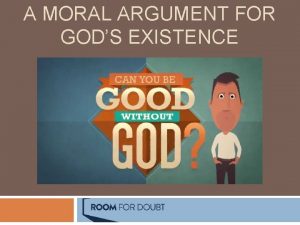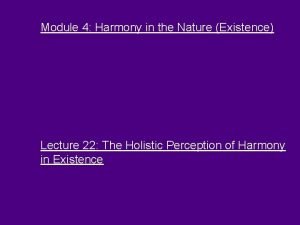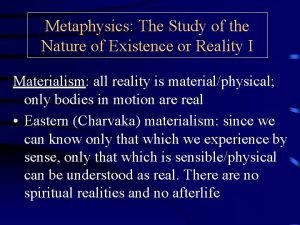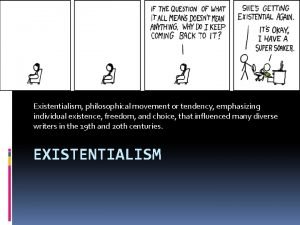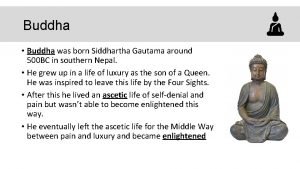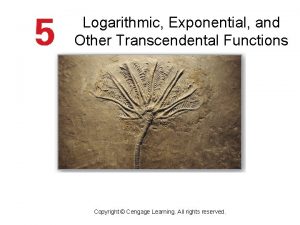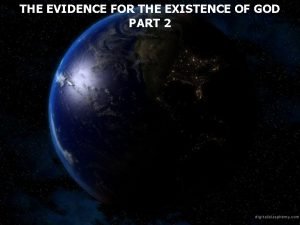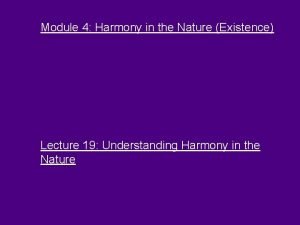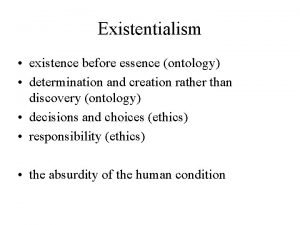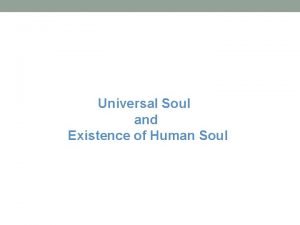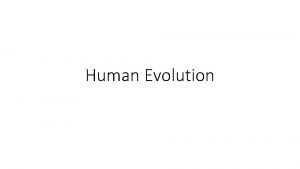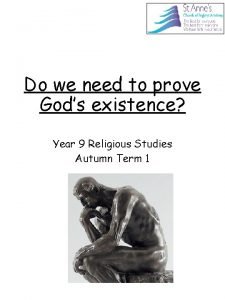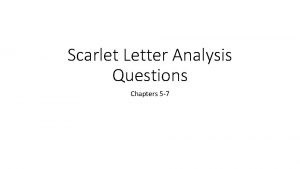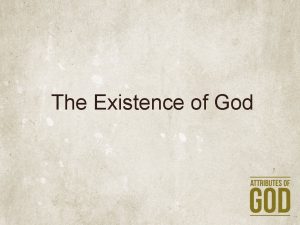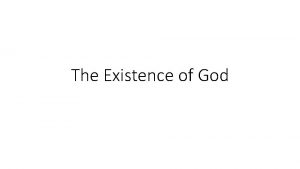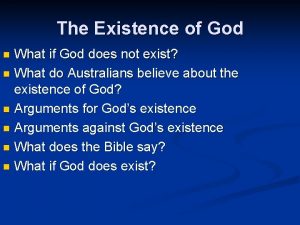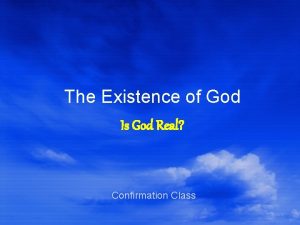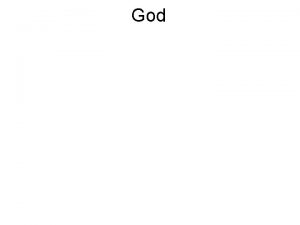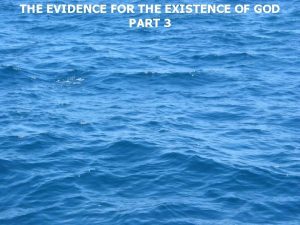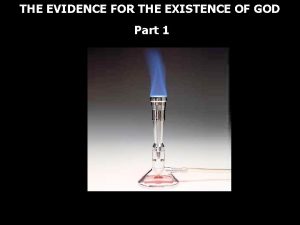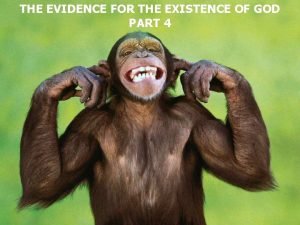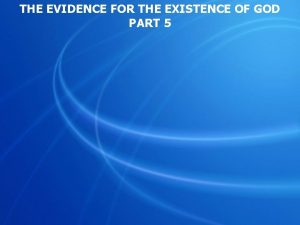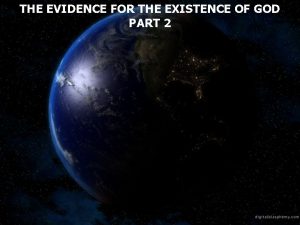The Existence of God Part 1 The Four



























- Slides: 27

The Existence of God Part 1: The Four Major Arguments By Stephen Curto For Homegroup October 28, 2018

The Goal of Any Theistic Argument To remove objections to the existence of the God of the Bible. • Remove Objections, not “Prove” • The God of the Bible, not just any supernatural being. • Personal • All-knowing • All-powerful • Unchanging • Self-existent • Etc.

The Moral Law Argument The presence of a moral law suggests a moral law-giver. Defining by Negation • Not about whether someone can behave morally without believing in God. • Not about whether moral behavior can be defined without reference to God. • Primary Text: Romans 1 -2

The Moral Law Argument The presence of a moral law suggests a moral law-giver. • “If obligations arise from personal relationships, then absolute obligations must arise from our relationship with an absolute person. ” - John Frame, Apologetics • “The Law of Human Nature, or of Right and Wrong, must be something above and beyond the actual facts of human behaviour. In this case, besides the actual facts, you have something else a real law which we did not invent and which we know we ought to obey. ” - C. S. Lewis, Mere Christianity

The Moral Law Argument The presence of a moral law suggests a moral law-giver. • “If obligations arise from personal relationships, then absolute obligations must arise from our relationship with an absolute person. ” - John Frame, Apologetics • “The Law of Human Nature, or of Right and Wrong, must be something above and beyond the actual facts of human behaviour. In this case, besides the actual facts, you have something else a real law which we did not invent and which we know we ought to obey. ” - C. S. Lewis, Mere Christianity

The Moral Law Argument Dealing with the Culture: • “Morality is not objective, it’s relative. ” • “There doesn’t have to be anything above or beyond the moral laws themselves. ”

The Moral Law Argument Dealing with the Culture: • “Morality is not objective, it’s relative. ” • Rape, Incest, Murder • If morality is relative to cultures, then which culture decides what is moral? • If morality is relative to individuals, punch them in the face and walk away. • “There doesn’t have to be anything above or beyond the moral laws themselves. ”

The Moral Law Argument Dealing with the Culture: • “Morality is not objective, it’s relative. ” • Rape, Incest, Murder • If morality is relative to cultures, then which culture decides what is moral? • If morality is relative to individuals, punch them in the face and walk away. • “There doesn’t have to be anything above or beyond the moral laws themselves. ”

The Moral Law Argument Dealing with the Culture: • “Morality is not objective, it’s relative. ” • “There doesn’t have to be anything above or beyond the moral laws themselves. ” • The moral laws themselves are invisible, eternally existent, define good, bad, and justice, and hold man accountable to his relationships. These are all descriptions of the God of the Bible.

The Teleological Argument The presence of design in the universe suggests a designer. • Telos = purpose, completeness, end • Aka. “Fine Tuning Argument” or “Watchmaker Analogy” • Important note: designed but fallen • Primary Text: Psalm 8: 3 -4

The Teleological Argument The presence of design in the universe suggests a designer. • Examples of Design/Purpose: • Solar system • DNA • Photosynthesis • Biology • Laws of Logic





The Teleological Argument Dealing with the Culture: • “This place is pretty poorly designed!” • The problem of evil will be dealt with in future lesson. • The curse/fall explain the inefficiencies/death/decay. • Just because we don’t know a thing’s purpose, does not mean it has no purpose. E. g. appendix.

The Cosmological Argument All effects have a cause, the universe’s cause is God. • kosmos = world • Aka. “Unmoved Mover” “Uncaused Cause” “Necessary Being” • Thomas Aquinas, Summa Theologica “Infinite Regress” • The universe is finite, time-bound, space-bound, changing, material, therefore its cause must be independent of those constraints. (infinite, timeless, spaceless… etc. )

The Cosmological Argument All effects have a cause, the universe’s cause is God. • Stack of books analogy (contingency) • Dominos analogy • Primary Text: Genesis 1: 1

The Cosmological Argument Dealing with the Culture: • “Your argument is self-defeating. If all things must be caused, then what or who caused God? ” • “God is not necessary, the big bang explains the first cause. ”

The Cosmological Argument Dealing with the Culture: • “Your argument is self-defeating. If all things must be caused, then what or who caused God? ” • This misunderstands the definition of God. • “God is not necessary, the big bang explains the first cause. ”

The Cosmological Argument Dealing with the Culture: • “Your argument is self-defeating. If all things must be caused, then what or who caused God? ” • “God is not necessary, the big bang explains the first cause. ” • The big bang, stated in its simple and absurd form, is “Nothing existed, which exploded. ” For the big bang to have the same explanatory power as the Cosmological Argument, it must explain how something came from nothing.

The Cosmological Argument Dealing with the Culture: • “Your argument is self-defeating. If all things must be caused, then what or who caused God? ” • “God is not necessary, the big bang explains the first cause. ” • The big bang, stated in its simple and absurd form, is “Nothing existed, which exploded. ” For the big bang to have the same explanatory power as the Cosmological Argument, it must explain how something came from nothing.

The Ontological Argument The idea of a perfect being suggests the existence of a perfect being. 1. God is understood as the greatest conceivable being, by even the fool. 2. A thing exists either in (a) the understanding only or (b) in both the understanding and reality. (e. g. painter and his painting) 3. It is “greater” to exist in reality than to exist merely in understanding. 4. If God exists merely in understanding, then God is not the greatest possible being, since a being that existed in reality would be greater. 5. But God is by definition the greatest possible being. 6. Therefore, God exists not merely in understanding, but in reality

The Ontological Argument The idea of a perfect being suggests the existence of a perfect being. 1. God has all perfections. 2. Necessary existence is a perfection. 3. Therefore God exists necessarily.

The Ontological Argument The idea of a perfect being suggests the existence of a perfect being. • ὤν on = “being” • Anselm Proslogium puzzling over “the fool” • The most frustrating and fascinating of the arguments. • Primary Text: Psalm 14: 1, Romans 1: 13 ff

The Ontological Argument Dealing with the Culture: • “I have an idea of the flying spaghetti monster. ” • The flying spaghetti monster (and other non-Gods) are not perfect in their being. E. g. Roman Gods flaws.

 Moral argument for god's existence
Moral argument for god's existence Skhandas
Skhandas Sila samadhi panna
Sila samadhi panna What are the three characteristics of existence
What are the three characteristics of existence Weak entity crow's foot
Weak entity crow's foot Holistic perception of harmony in existence
Holistic perception of harmony in existence The study of the nature of existence
The study of the nature of existence Disembodied existence definition
Disembodied existence definition Gst 113
Gst 113 Existence precedes essence in french
Existence precedes essence in french Existential themes
Existential themes Identifier dependency in database
Identifier dependency in database Explanation experience existence exciting
Explanation experience existence exciting Eightfold path
Eightfold path A habitat supplying the necessary factors for existence
A habitat supplying the necessary factors for existence Factors of natural selection
Factors of natural selection Existence and uniqueness theorem linear algebra
Existence and uniqueness theorem linear algebra Lesson 3 existence and uniqueness
Lesson 3 existence and uniqueness Chapter 5 logarithmic exponential and other
Chapter 5 logarithmic exponential and other Existence
Existence Four orders of nature
Four orders of nature Existence before essence
Existence before essence účel (smysl) existence firmy určuje
účel (smysl) existence firmy určuje Universal soul theory
Universal soul theory Australopithecus years of existence
Australopithecus years of existence Exsistere
Exsistere Existence
Existence The scarlet letter chapter 5 quotes
The scarlet letter chapter 5 quotes
